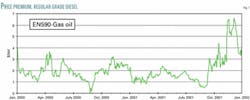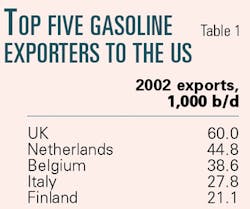Special Report: Europe could adopt zero-sulfur fuels ahead of schedule
When German refiners supply the country's markets with sulfur-free gasoline and diesel on Jan. 1, 2003, the event is likely to trigger a more widespread adoption of clean fuels in Northwestern Europe.
According to a new monthly analysis from Energy Security Analysis Inc. (ESAI), Wakefield, Mass., the switch to <10-ppm sulfur (zero-sulfur) fuels should give preview the challenges facing the rest of the Atlantic Basin as it eventually moves to zero-sulfur fuels.
The analysis, "International Fuel Specification Review," reports that the impetus for zero-sulfur fuels in Germany is a 4 ¢/gal tax break that will be transferred from sales of 50-ppm diesel, which is the current German standard.
Germany is Europe's largest gasoline market (650,000 b/d) and second largest on-road diesel market (540,000 b/d).
The rest of the European Union (EU) is not required to produce zero-sulfur fuels until 2009.
Costs, supply factors
The cost of producing 10-ppm sulfur diesel in Germany is an estimated incremental 10 ¢/gal vs. the current European standard of 350 ppm, according to ESAI.
Market prices have supported this estimate; according to the November report, the differential has averaged a little less than 9.5 ¢/gal.
ESAI said that Netherlands Refining Co.'s plant in Rotterdam, Netherlands, will also produce a significant amount of zero-sulfur fuel for Germany.
Technology to achieve zero-sulfur fuels has improved recently, especially in the area of more-efficient catalysts. Also, some desulfurization tradeoffs including the loss of octane are not an issue anymore, the analysis said.
Markets, price impacts
Fig. 1 shows that there was a run up in regular grade diesel (EN 590) prices in 4th quarter 2001, when Germany switched to 50-ppm diesel.
The analysis said that refiners scrambled to make enough clean product, which left the 350-ppm sulfur market short of supply. The price increase was partially caused by a shortage of barges and clean storage, which could not easily switch between the two fuel grades.
ESAI feels that a similar market dynamic can occur with the switch to 10-ppm sulfur diesel. The analysts foresee the possibility of shortages not only of 10-ppm sulfur diesel, but also of 50-ppm sulfur diesel, and regular-grade diesel and gasoline. These supply difficulties should ease once the initial changeover occurs.
The price differential between 10 ppm and 350-ppm sulfur diesel should hover around $2-3/bbl, according to ESAI.
The price premium for 10-ppm sulfur gasoline should be around 24¢/ bbl vs. 50-ppm sulfur gasoline and 48¢/bbl vs. 150-ppm sulfur gasoline.
EU countries
ESAI is forecasting that the Benelux countries and the UK in 2003 will follow the German lead in zero-sulfur fuels by rolling over existing 50-ppm sulfur tax incentives. Because they supply Germany with imported fuel, the Benelux countries adopted the 50-ppm standard when Germany switched over in 2001.
Fig. 2 shows the European 2003 diesel market by type of fuel. This fragmented market could lead to a "boutique" fuel situation with associated volatility in times of shortage.
Other effects
The US gasoline market depends on Europe for imports of gasoline and blending components, including about 10% of reformulated gasoline imports.
According to the November report, the US received more than 50% of its European gasoline imports from the UK, Netherlands, and Belgium (Table 1), all of which could switch to zero-sulfur gasoline in 2003.
A switch to zero-sulfur gasoline means less-clean blending components available for export to the US. ESAI said that the next test might be summer 2003 when clean components will be at a premium in the US because several California refiners decided on an early phaseout of MTBE.
The analysis said that another by-product of European refiners' switch to low-sulfur fuels is an increase of high-sulfur distillate and heavy fuel oil.
Many European refiners, according to ESAI, are fractionating out the heavy tail ends of various product streams to achieve ultralow sulfur targets. These tail ends are dumped in the heating oil or fuel oil pool, causing increased production of those streams.



